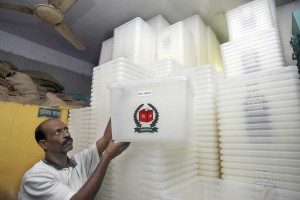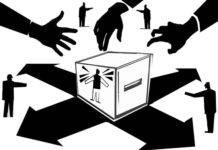Does poverty keep people from engaging in political participation and in their democratic rights such as voting because the poorest people are only concerned about surviving?
If that were true, how does poverty affect democratisation of a country like Bangladesh where 26 percent out of the 160 million people of the country live below the standardised poverty line?
Is politics only for the wealthy and powerful? If so, does that tilt the balance of democratic values more towards autocratic practices?
My argument points the blame towards inequality and lack of information or education rather than poverty itself. It is these things that prevent the poor from fully participating in society to promote democratic institutions and policies as equally as these restrain the rich from the same.
I will be looking into the argument that the poor are not the problem and that the rich pose just as much of a hindrance to democratisation as the poor, although poverty on an individual level can be a strong reason for not participating in democracy as explained by Amartya Sen (1999).
I will then be looking into the role of inequality, lack of information and democratic economies and institutions themselves, drawing a conclusion from my arguments.
The poor are not the problem
It may be true that the poor may be ill-equipped to create a collective force to keep the government in check or to rise up against the democratic government if it does not keep its promise to bring about changes before the election to win votes.
It may also be true that the poor are more susceptible to following a leadership – as suggested by Seymour Martin Lipset (1959) – because they may not have anything to lose or it may be because to a poor person the difference between a dictatorship and a democracy may not exist as neither may allow them to have their own voice or allow them a fair representation in policy making.
But this does not mean that they do not inherently possess democratic values (again as suggested by Lipset (1959)). They may also have less capital to invest in industrialisation which is also a factor considering industrialisation leads to richer democracies, for example as Britain grew rich with increased industrialisation and greater stability of property rights it also became more democratic.
From first reform law in 1832 to the Representation of the People Act in 1919, British political elites created a fully democratic polity. Amartya Sen argues that the poor are also likely to be reluctant to vote due to higher opportunity cost for the time it would take to go and vote or the transport money that would be spent to travel to vote.
On the other hand, because they also have more to gain from a certain policy change, for example a change in the agrarian sector, they may also be more eager to vote; my argument is that these resultant actions are not the result of poverty, although money will be a factor.
The reasons for people behaving this way is due to lack of education; greater inequality means the poor are kept at a distance with no say in policy making while the rich elite who have a voice in government support policies that protect their own interests.
Citizens need to be educated for democracies to function as Lipset (1959) demonstrates, ‘The higher one’s education, the more likely one is to believe in democratic values and support democratic practices’. Also substantiated by Daniel Lerner (1958), ‘Urbanization leads to literacy and modern media, then to political participation (voting)’.
As argued by Adam Przeworski (2008), greater inequality may also be a reason for the rich to feel more threatened by the poor and therefore democratic institutions that are pro-poor are not supported by them. This goes hand in hand with conspiracy theories that hint that a population may be deliberately kept lowly literate so that they can be better controlled by the rich minority.
Acemoglu, Daron, and James A Robinson (2006) go on to argue that democracies mean resource distribution, and in poorer economies the rich have more to lose as the poor may be asking for too much, whereas in a richer economy that would not be the case since the poor are not as poor as in a poor economy and the rich would therefore not have to give up as much.
In this case poverty is seen to play a part but, in a country where there is a rich minority with a poor majority, if the poor were educated about democracy, their rights, and if they were protected by a strong legal system, would they give up the chance to urge a government for a fairer redistribution knowing what they could gain from it?
If they had the political power, a fair representation within the government, that is, de facto power (Acemoglu et al), then the economy would become more democratic as the power would be more equally distributed amongst the citizens. The rich people may hold more power for various reasons but they do not attain power solely based on the amount of money they have.
Inequality, lack of information and the media
A strong network of free press and media that is capable of reaching an entire nation and is protected by a legal system allows a nation to be better informed. But how many poor countries actually have a free media that reaches to all parts of that country and how many revolutions were actually started and strengthened in its collective capabilities with the help of the media?
It can be argued that very poor people may be apathetic to being in tune with the media or where a population is very poor they do not have the luxury of dabbling in the risky profession of journalism, but then again, it all leads to a lack of education or being in fear of persecution in economies that are more of a quasi-dictatorship than a full democracy.
Poor people do have opinions on politics, in many cases more so, as they are directly and mostly affected by it, but a lack of education usually prevents them from being informed to gather a collective force, and without a unbiased legal system, the population may always be in fear of being suppressed by the government at any cost and they are usually less able to protect themselves due to the lack of money or influence in the political sphere.
This also points to the fact that all these scenarios are examples of countries with inefficient democratic institutions. I am of the opinion that democratic stability leads to democratic values as put forth by Przeworski rather than the other way round in Lipset’s theory.
Instead of trying to focus on whether the egg or the chicken came first with regards to whether the focus should be on economic growth and not democracy (Robert Barro (1996)), my argument is that democracy does lead to more economic growth but only if the economies are true democracies. If it is accepted that democracies reduce poverty and promote economic growth, then the terms may be used interchangeably, unless one doubts the capacities of democratic institutions.
What a true democracy is may still be an ambiguous topic, but if poverty was a barrier to democracy one would not expect countries like India to become democratic and poor countries could not come out of poverty into democracy with injections of aid (which has failed in most cases). Lipset was, however, right about education; primary education does lead to more pro-democracy attitudes and therefore more participation.
Even though many authors argue that civil war, conflict, economic growth all run in circles in its own vicious cycle and that countries are usually incapable of coming out of conflict, poverty may only play a role when starker conflict exists due to less resources to redistribute. In an efficient democracy, everyone would have the right to education, protection under its legal system, fair elections and larger turn outs at voting centres and a fair distribution of resources.
Democracy is good for the poor
One issue that has been raised earlier is the difficulty in understanding what makes an efficient democracy. The other aspect of understanding democracy would be to look at how it deals with poverty. If a democracy is supposed to be a representation for the majority of a society, then why are ‘efficient’ economies such as Britain still handled by the rich white collared male, policies still lobbied for by the rich population, the most powerful institutions including the judiciary still run by the rich and not to mention the cases of ‘pork-barrel spending’ or ‘earmarks’ (unnecessary government expenditures to win over a certain group of people usually right before elections) as they are known, which is prevalent in both rich and poor economies?
Why is the voting turn-out so poor in rich countries like America, whose GDP may be high but which still has a vast majority of homeless and poor people? Democracy is not the solution to everything and most countries still do not practice democracy to its full meaning. Poor countries need to show they are democratic to play the field in globalisation and modernisation and get their poor to the voting pool, who would in many cases much rather just be working on their fields as politicians never really did much for them anyway.
Even rich economies like Britain have to try to entice its student population to care about voting by broaching policies that directly affect them like tuition fees (the way it was used before by the liberal democrats) or more training opportunities at work. But what would be the alternative? Surely, looking at dictatorships is now pointless as it has been left in the past for good, and any country that may dare to show that dictatorships have their good sides seeks to lose out in the international market. Karl Marx (18th Brumaire of Louis Bonaparte) also points out that democracy leads to class struggle as the poor use their vote to extract money from the rich and the rich respond by cancelling elections or a coup d’etat.
I have argued that democracy can reduce poverty by fairer distribution, more education, strong media and an unbiased legal system that protects all, but does poverty reduce democratic values? Evidence demonstrating that democracy is usually not fully and efficiently practised in both rich and poor economies suggests otherwise.
Examples range from India to Argentina to show that both the rich and poor economies may struggle or succeed in maintaining a stable democracy. In fact, no evidence exists to suggest that the poor have undemocratic attitudes. The rich have equally self-motivating interests to have undemocratic attitudes. Inequality plays a bigger role than poverty in hindering democratisation.
Thus countries with low inequality, where both the rich and the poor have less reasons to fear policy changes, are likely to be better at maintaining a status quo, whether that be democracies (for example India) or a dictatorship (for example Singapore).
Therefore, from my arguments, it is my conclusion that poverty on an individual level may be one of the many causes restraining a poor person from getting more involved, but I have stressed more on the importance of having lower inequality, more education, a strong media, an unbiased legal system, and another point may be a strong banking system that could allow peasants to become commercial farmers for an economy to become more industrialised.
The problem with saying that poverty is a barrier to democracy is that it automatically puts the entire poor population of a country in one generalised category. It is important to realise that not all people are so poor that they have nothing to lose, that not all poor people are illiterates or apathetic about policies and politics, not all poor people are peasants but that each individual plays a different role in its society and democracy.
Source: bdnews24










